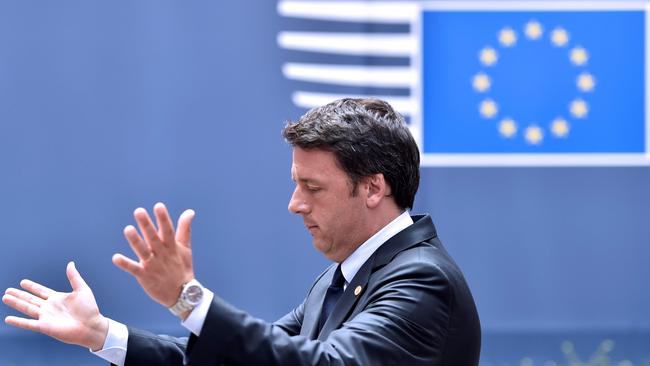Italy’s perfect storm could topple the EU

Approaching eight years since the financial crisis, the European banking system remains its vulnerable underbelly and the economies and banking systems of the southern Europeans remain fragile.
Unlike the US and UK, continental Europe was slow to respond to the fissures within its banking system exposed by the crisis, initially trying to paper over the problems and hope that growth would eventually solve them. The weakness in that approach is that economies like Greece and Italy have deteriorated, not strengthened, as have the underlying condition of their banks.
Compounding the problem confronted by the banks in southern Europe, and their governments, has been the eventual approach the European regulators took to shoring up their system.
In keeping with the rest of the world they began implementing the new Basel III regime for capital adequacy, forcing regulatory capital requirements higher, while also introducing a new regime for EU bank recovery and resolution.
That regime started in January last year. At its core is a distancing of taxpayers from bank losses — bank shareholders and creditors, even some depositors, have to absorb losses amounting to about 8 per cent of a bank’s total assets before taxpayers funds can be called on.
Spain acted pre-emptively, establishing a “bad bank” fund financed by taxpayers and the industry to take on the worst of its banks’ bad debts. Italy, however, didn’t and has been caught with a banking system that desperately needs capital but doesn’t have access to it and the government is prohibited from providing it.
The Italian Prime Minister, Matteo Renzi, tried to wriggle around the prohibition by strong-arming Italy’s banks and insurers to finance a fund to acquire bank bad debts and provide capital to struggling banks.
The Atlante fund raised €4.25 billion (about $6.4bn) earlier this year, but in a system with about €360bn ($540bn) of non-performing loans — more than 18 per cent of all loans — that’s obviously nowhere close to being sufficient to stabilise its system.
Brexit has created a fresh wave of pressure for the Italian banks, and an opportunity and leverage for Renzi.
There has been a widespread sell-off of European banks in the wake of the expected outcome of the Brexit vote, with the sector’s share prices down about 16 per cent. That takes the losses so far this year to about 33 per cent.
The Italian banks have been smashed. Italy’s biggest bank, Unicredit, has lost more than 30 per cent of its value since the vote and more than 60 per cent since the start of the year.
Renzi, under pressure from the surging popularity of the Eurosceptic Five Star Movement, is trying to seize the moment created by Brexit and the effect it might have on other EU countries disenchanted with the state of the union.
The aggressively anti-establishment Five Star Movement’s success in Italy’s local elections this month — it won the mayoral contests for Rome and Turin as well as a host of less high-profile cities and towns — is a threat to Renzi and his Democratic Party and to the EU. He is trying to exploit the EU’s fear that Brexit might encourage others and create momentum for the disintegration of Europe and the end of the European Project.
Having previously failed to gain an exemption for Italy from the prohibition on taxpayer support for troubled banks, he is trying again to convince the EU authorities to allow his government to inject about €40bn ($60bn) of public funding into the system, either as capital or guarantees.
The prospect of bank failures if the Italian banks aren’t bailed out would be a political nightmare for Renzi — and very disconcerting for the EU authorities given the potential boost it would provide to anti-EU forces in Italy.
When four small Italian banks collapsed last year it wasn’t only shareholders who lost their investments but bondholders, including the retail bondholders common within the Italian system.
In an economy — the EU’s third-largest — that has shrivelled since the crisis, with a decimated industrial base and high unemployment rates, it that were to recur but on a far larger and broader scale, the prospect of Italy revolting and emulating the UK couldn’t be disregarded, which is the leverage Renzi is opportunistically/desperately seeking to exploit.
The corner Italy finds itself back into exposes both the initial tardiness of the EU authorities in shoring up their banking system when that was obviously the pre-requisite for any prospect of an economic recovery and the crude nature of the reforms it did belatedly implement, which might work if the underlying system was sound at the point of the introduction of the recovery and resolution regime but is dangerously counter-productive if, like Italy’s, it isn’t.
The predicament Italy is confronting within its banking system and the way it interacts with the EU’s rules is another illustration of the systemic institutional weaknesses that permeate the EU structure. It tries to operate and set rules as if it were one economic and political unit, despite the reality that it comprises, for the moment at least, 28 quite distinct and different sovereign states.
As was seen with Greece, when it was threatening a “Grexit”, the EU can find ways to bend its rules when it has to, which is no doubt what Renzi hopes to convince Brussels to do. If he fails, the prospect of Italy opting out of the EU, a far more complex exercise than that facing the UK given Italy is part of the eurozone, would become more real.
For the EU, even the remote possibility that the eurosceptic forces in Italy and elsewhere might be strengthened and encouraged by Brexit has to be defused before it gains real traction.
The plight of Italy, however, underscores how difficult it might be to hold together an uneasy and increasingly fractious union, with rules designed by and for its stronger economies, in a post-Brexit environment where the EU is even more dominated by its most powerful member, Germany.



If Brexit exposed the seething tensions and structural deficiencies within the EU’s “one size fits all” approach to the quite disparate economies and cultures within the bloc, it may be about to confront a challenge that is much closer to its core.